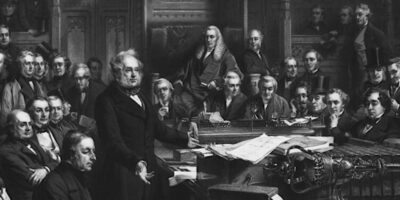Unlike Oren Cass, F.A. Hayek Knew the Economics of Trade

Quoting F.A. Hayek’s 1960 claim that free markets will bring about a “balance … between exports and imports,” Oren Cass argues that the string of annual U.S. trade deficits over the past 44 years proves that Hayek was wrong – that history has “broken” Hayek’s “promise.”
Being a non-economist, Mr. Cass can be forgiven for missing Hayek’s meaning. The balance to which Hayek refers is not a strict equality between the value of a country’s exports and the value of its imports. Hayek means, instead, that there is a market process that connects exports to imports in a predictable manner: specifically, and contrary to popular mythology, if imports fall so, too, over time will exports fall. Hayek was bemoaning the widespread misconception – borne of a failure to grasp basic economics – that an optimal amount of exporting and importing can be achieved only if trade is controlled by government.
But because Hayek knew, as all competent economists know, that international investment flows break what would otherwise be a necessary equality between imports and exports, it’s wrong to interpret him as ‘promising’ that unimpeded markets would ensure that the value of a country’s exports will always, or even generally, equal the value of that country’s imports.
Mr. Cass makes much of the fact that, when Hayek wrote these words, the U.S. was in the midst of “two decades of a small and consistent trade surplus” – thus suggesting that Hayek relied on that current reality as evidence for his alleged claim that free markets generally produce for each free-trading country equality between exports and imports. (Overlook here the fact that those trade surpluses are actually not an equality between exports and imports.)
But as demonstrated by his extensive scholarship, Hayek was deeply learned in economic history. And so he surely knew, for example, that Great Britain consistently ran current-account surpluses for much of the 19th century. And so he surely knew also, as reported by the late William Niskanen, that “[f]or about 300 years, from the first English settlements in Virginia and Massachusetts until World War I, foreigners invested more in the area that became the United States than Americans invested in other countries”* – that is, that the U.S. consistently ran a string of so-called ‘trade deficits’ for three centuries. Therefore, any suggestion that Hayek ‘promised’ that free trade would ensure that the value of exports from each free-trading country will generally equal the value of its imports is unjustified.
In closing, it’s worth continuing the above quotation from Niskanen in order to show just how unwarranted is Mr. Cass’s worry that consistent U.S. trade deficits pose a danger to the American economy, and how such unwarranted worries are nothing new among people who fall for populist fallacies: “This [three-century-long string of U.S. trade deficits] permitted the capital stock in the United States to grow more rapidly than could have been financed from our own saving, a condition that was an important contribution to the growth of output and real wages in the United States. This process accelerated in the nineteenth century with British investment in railroads, German investment in chemical plants, and so on. For the most part, American officials welcomed this net import of capital despite occasional populist complaints about the foreign ownership of domestic firms.”*
It’s always possible to make arresting claims by quoting scholars out of context of their larger works and range of knowledge. But doing so serves neither the cause of scholarship nor of good public policy.










